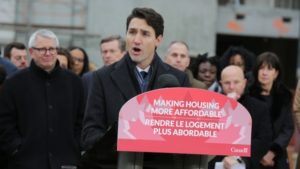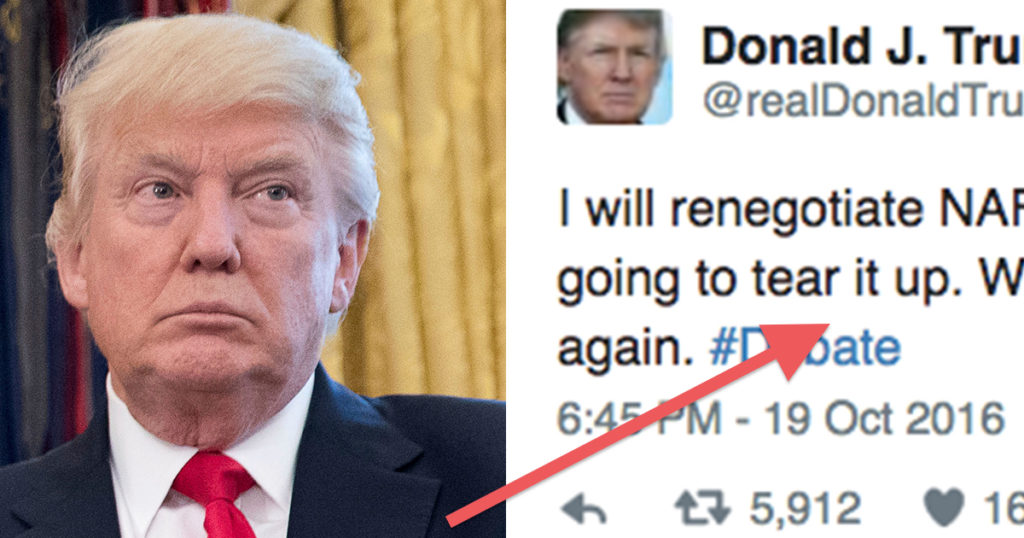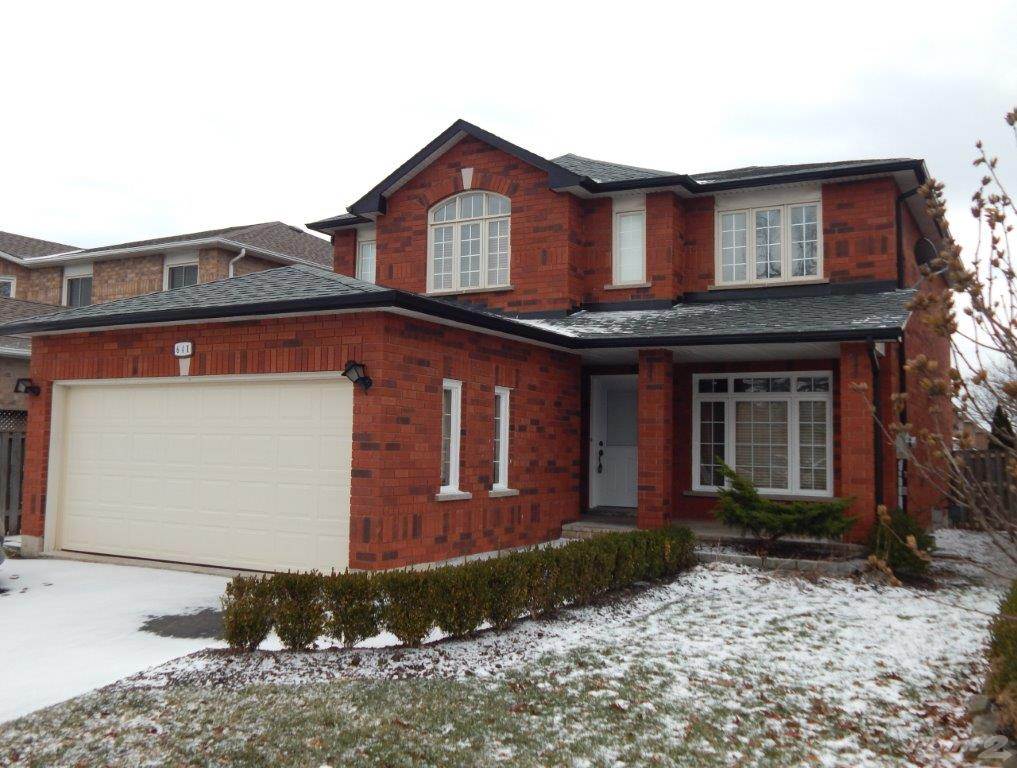 By Ray Rivers
By Ray Rivers
December 18, 2017
BURLINGTON, ON
This is the second of a two part series on affordable housing and the changes made by the federal government.
After he retires, which is not anytime soon, Justin Trudeau will be eternally remembered for giving us legit whacky-tobacky. But he will also have performed one of the largest re-distributions of income this country has seen. And that is not just about the modest changes his government made to the income tax structure, favouring the middle class, his first year in office.
 No it’s the $40 billion dollar ten year affordable housing strategy which is to kick in sometime after the next election, providing the provinces kick in their shares as well. The details are scarce but putting that much money in the hands of people who are finding it hard to get affordable accommodation will be a huge economic stimulus for the country.
No it’s the $40 billion dollar ten year affordable housing strategy which is to kick in sometime after the next election, providing the provinces kick in their shares as well. The details are scarce but putting that much money in the hands of people who are finding it hard to get affordable accommodation will be a huge economic stimulus for the country.
That may be prudent given where Canada may be in its business cycle, particularly if NAFTA hits the dust bin, as I expect it will. It may also stimulate home building and urban restoration as rental units and high rise condo’s come to fill the gap between demand and supply of housing for Ontario’s growing population. But if the economy keeps moving the way it has under the Liberals, it could also lead to inflation.
 Perhaps that is why Trudeau is delaying the start up until 2020. Cynics will note that this is also an early 2019 election promise. But after the run-up in house prices recently nobody should argue that there is a problem with affordability, certainly for single homes. And as house prices go, so too must go rental costs eventually.
Perhaps that is why Trudeau is delaying the start up until 2020. Cynics will note that this is also an early 2019 election promise. But after the run-up in house prices recently nobody should argue that there is a problem with affordability, certainly for single homes. And as house prices go, so too must go rental costs eventually.
There was a time when owning a home was everybody’s dream, but those days appear to have come to an end. Two thirds of Canadians still own their own home but that is changing as the cost of home ownership continues to rise. The average price of a home in Canada has topped half a million, despite a cooling-off in the Toronto and Vancouver markets.
Given that average household income are around $70,000 (2015), it would take at least seven or eight years for a new home buyer to pay off their mortgage – providing they used all of their gross income to that end – and lived on water and hope. Practically, those who own their own homes spend less than 20% of their income on housing. Of course that statistic would be higher except that many have already paid off their mortgages and only face costs for maintenance and property taxes.

Offered at $789,900 – estimated monthly mortgage $2891.00
Still given those numbers it would take the average homeowner up to 40 years to pay off their mortgage unless they inherited a bundle, won the lottery or got a federal handout along the lines of what Mr. Trudeau may be talking about. Otherwise a thirty year-young couple might be 70 by the time they paid off the banks – just in time for one of those reverse mortgages to free up some cash so they could spend the winter in a rented trailer in Florida.
Renters, who typically are lower income earners, shell out 30% of their pay packet for a roof over their heads by contrast. That represents a bigger bite out of a smaller pay packet and they will undoubtedly be the primary target for the new affordability strategy. Chances are dim that they’ll ever get into the ownership market. Spending 40 or even 20 years before one can burn that mortgage paper is a long time.
There are financial advisors who argue that it would be better for one’s financial health to rent and let them invest that cash that would otherwise be plowed into a house. They say this with a straight face, even knowing that a primary residence is capital gains tax-exempt. They ague that history shows a house’s value will just keep up with inflation while they can do much better with somebody else’s money in stocks and bonds. And perhaps they can though there was a lot of money made buying and selling Toronto and Vancouver houses, just recently.
But this federal-provincial affordability program is not going to do much for those who already can afford their homes – it presumably will only target those in need. Early indications are that priority will be to encourage new developments which also meet other development goals at all levels. Narrowing the income gap between rich and poor, stimulating the economy, facilitating urban renewal and mitigating climate change is a pretty tall order for any program. Mr. Trudeau called this initiative a once-in-a-generation event. And if he can pull it off he will leave a lasting legacy for his generation.
 Ray Rivers writes weekly on both federal and provincial politics, applying his more than 25 years as a federal bureaucrat to his thinking. Rivers was a candidate for provincial office in Burlington in 1995. He was the founder of the Burlington citizen committee on sustainability at a time when climate warming was a hotly debated subject. Tweet @rayzrivers
Ray Rivers writes weekly on both federal and provincial politics, applying his more than 25 years as a federal bureaucrat to his thinking. Rivers was a candidate for provincial office in Burlington in 1995. He was the founder of the Burlington citizen committee on sustainability at a time when climate warming was a hotly debated subject. Tweet @rayzrivers
Background links:
Canadian House Prices – Average Household Income – Home Ownership –
Changing Home Ownership – Recent Renting Changes – Housing Stock –
Affordable Housing – Housing Bubble – Bad Policy –
Federal Plans – Public Housing – Home Ownership –
House as Investment – More Investment –
Related editorial content:
Part 1 of the Affordable housing feature



















Ray, this idea is the definition of insanity. The Toronto experience with running public based housing will only be multiplied by a factor of 10x. Look at the experience in the UK. Governments do a terrible job running services because everything becomes politicized. Once you are into this stuff no one can get out of it. As much as some people like to complain about it, the 407ETR works because government doesn’t own it or run it – can you imagine the screaming bloody murder every time the fares went up. Yes it is expensive but that keeps the balance of volume on it so it moves properly.
Governments need to get out of providing services where they can and just provide regulations for safety, the environment and such. They should be creating the conditions for building affordable housing to attract industry. Part of that should be the analysis of cost drivers. Ideas like this are in same camp as providing a guaranteed minimum income – while they are nice in concept and appeal to caring people (most of us), they destroy initiative and burden the populace who pay, not the government. The First Nations debacle is another example – we spend billions per year and big issues remain. How can we trust a government that promised to fix up the situation with First Nations and has done little – oh, I guess our buddy in Ottawa figured out that throwing more money at it wouldn’t fix the problem (as it doesn’t with most areas), it needs the hard work of reform but reform based on good information and dealing with difficult issues that politicians don’t want to touch. We are spending as of this year at the federal level over $300 billion on programs (does not include 25B in interest payments). 10 years ago is was just under $200 billion. What have we fixed for spending another $100 billion per year? All the issue remain, if not more.
So I come back to my first point on what governments need to stay out of these areas. When the full burden of these nice ideas hit the populace and the economy, we will be are forced to cut them back to the screams of all the entitled. The well to do and heavily taxed non-government paid folks will have left, taking their money with them (or have it off shore) and this includes the 2 (Trudeau and Morneau) that are leading us into this abyss. To borrow a phrase from an old TV program (showing my age here), “Let’s Stop the Insanity”.
Good point Stephen – I had thought to raise it because you are right that the affordability issue will go away for many when their parents do… but in the meantime…. Thanks for reading and commenting, It is really good to get feedback even if we don’t always agree. Have a great Christmas.
Ray
I seem to recall another Liberal Prime Minister whose legacy is that he fixed the health care system for a generation. There is nothing to equal the grandiosity of the Liberal minds with such pronouncements. A promise that depends on success in the next election and the provinces ponying up is political smoke and mirrors.
What is missing from this analysis is generational wealth transfer. Baby Boomers like me are not going to live forever, and even if we live longer there will still be a significant transfer of wealth to children and grandchildren.
The bigger problem is debt load. The average Canadian family is carrying about $1.71 for every dollar in equity. This is the highest level in history, and every major economist and think tank cites this as a serious issue. Part of the problem with housing affordability is that households also are carrying a huge amount excessive debt in things other than housing (e.g. credit card debt; student loans; vehicle loans; vacation properties; etc.).
My parents’ generation were able to afford a home by scrimping and saving. They grew up during the Depression and learned the value of saving and delayed gratification. My father didn’t buy his first new car until he was 49, and even then it was a compact vehicle. By contrast, I’m astounded at the number of young people driving new Bimmers and Mercs, all thanks to generous leasing provisions, 7 year car loans, no interest loans, etc. Everyone wants the best of everything, and no one is prepared to wait.
I am also a Baby Boomer. The greatest transfer of wealth in history has already begun. Do not wait until you expire talk to your accountant.
The idea of family transferring wealth down through the generations is whats supposed to happen.
As for Trudeau’s legacy….Sorry it’s hard to type while laughing and shaking my head.